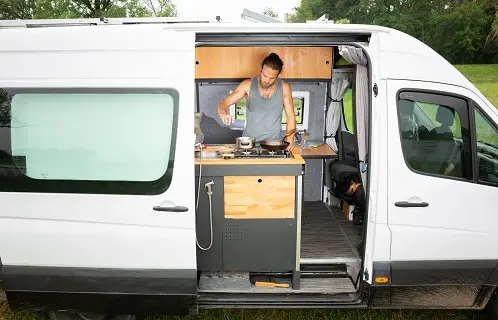Cargo vans and passenger vans are becoming increasingly popular in recent years, but many vans are converted to make them more appropriate for what the buyers want them for. While a cargo van may already be versatile, it can be totally transformed with a few choice customizations.
Both cargo and passenger vans can be converted for other uses. The cargo van however is probably the easiest and cheapest to convert as it offers the owner a basic shell to work with. A passenger van needs to have all seats and accessories removed before work on conversion can begin.
Van Conversions
There are two main types of conversions that cargo van and passenger van owners make to their vehicles:
1. Converting them to a crew cab version
2. Converting them to a camper van
Crew Cab
A crew cab is a van which has one row of seats behind the driver for additional people besides the one in the seat next to the driver. Behind this row of seats is a freight area available for either passenger’s baggage or for commercial purposes.
Crew cabs are very popular with businesses which need several people on a worksite as it can transport all of the workers plus their equipment.
Camper Van
A camper van combines a mode of transport which includes sleeping accommodation. A camper van is therefore a combination of car plus caravan, all in one.
Results of Conversions
While either a cargo van or passenger van can be converted to provide similar results, different amounts of money and labor may be needed to achieve those results.
Converting to a Camper Van
Conversion of Cargo Van to Camper
Apart from the front seats, a cargo van provides you with an empty shell to which you can add what you like to convert it to the type of vehicle you desire. If it is to be converted to a camper, the fact that it has solid sides will make it easier to insulate than if it had windows.
Conversion of Passenger Van to Camper Van
With a passenger van, before you can start adding what you need to convert it to a camper, you will first have to remove all the seats plus any accessories. This can represent a lot of work prior to you even starting the conversion.
If you wish to leave the side windows in the camper, the van will not be able to be insulated as well as if it had no windows. If you want privacy and better insulation, then of course there will also be extra work removing the windows before you actually start the conversion.
Converting to a Crew Cab Van
Conversion of a Cargo Van to a Crew Cab Van
Converting a cargo van to a crew cab van is relatively easy as the most basic only type only needs a row of extra seats fitted behind the driver. However, unlike a passenger van no moew comfort is created for the extra passengers, such as air conditioning. The cargo area, though is already in place and so needs minimal conversion.
Conversion of a Passenger Van to Crew Cab
While nothing will have to be added to afford the row of passengers extra comfort, the fittings for the other rows of seats will have to be removed to create a cargo area. These extra rows of seats may include A/C vents and cup holders as well as just the basic seats.
Also as a passenger van will have windows along its sides, they may have to be removed if you want expensive work equipment not to be visible in plain sight.
Important Advice Before You Choose

While both a cargo van and passenger van can be customized or converted in similar ways to provide a crew cab van or a camper van, there are several differences in how that is done.
A cargo van gives you an empty shell, and so you can start conversion immediately. A passenger van on the other hand, having been designed to only carry passengers, will first have to be dismantled to a bare shell prior to starting any conversion.
However, if you want your completed conversion to include windows along the sides, a passenger van may be the best choice to start with. Although the windows may make it difficult to insulate the converted van, fitting side windows to a cargo van may prove even more difficult.
Both cargo vans and passenger vans are cheaper than camper vans, so many people opt to buy the cheaper vans and then do their own conversions. This may have extra costs and labor, but at least they end up with a van to their own personal specifications.
While some people convert cargo vans or passenger vans to crew cab vans, as the initial price of a crew cab van is not much different, these are not so common conversions. The cost of a cargo van or passenger van plus the cost of conversion may even make the converted crew cab van more expensive than a new crew cab van.
Some of the reasons people convert cargo vans to camper vans are:
- They are often easier to drive and tend to ‘blend in’ better with regular traffic
- When the conversion is completed the van is unique and complies with their exact personal needs
- A cargo van will usually offer a far better fuel efficiency, affording the owner the opportunity to re-coup some of the conversion costs
Useful Details to Understand Cargo Vans and Passengers Vans
Cargo Vans
Cargo vans are available in several different sizes and are the most popular for commercial ventures.
A cargo van has a seat for the driver and one passenger beside them. To the back of those two seats is an area designated as a space for cargo. As well as the front doors for the driver and passenger a cargo van has a side door and a rear door. Access can also be made to the cargo section via a space between the two front seats, making any of the cargo easily accessible to either the driver or passenger.
Cargo Vans and Businesses
This design has made cargo vans popular with businesses especially small businesses. While the cargo section is not as large as other vans the cargo van’s cargo section is more easily accessible and allows for items to be located and removed without even having to leave the van. This is of particular advantage in times of inclement weather conditions.
A cargo van does not have as much power as most other larger vans but is ample for its recommended weight limit. Due to its compact design and ease of loading due to its multiple doors, a cargo van can hold a surprising amount of freight.
Many large businesses now have cargo vans numbered among their fleets as they are more fuel efficient than their larger vans and so financially viable for smaller loads.
It is small businesses though who benefit most from a cargo vans features. Most small businesses do not need to transport large and heavy loads and a cargo van can easily be customized to any small business’s unique needs.
As the van has no windows on the sides, it can also become a mobile advertisement for the business by placing placards on both sides.
Converting a Cargo Van to a Family Vehicle
Due to a cargo van being easy to customize, you can easily add extra seats to comfortably accommodate all family members. If this is done it will still allow plenty of space in the cargo section for family baggage plus camping equipment if necessary.
Many small business owners will buy a cargo van as they can use it as a business vehicle during the week and as a family vehicle on weekends and holidays. This will of course save the business owner from buying two vehicles, one for each purpose.
Passenger Van
A passenger van is described as a vehicle other than a car which is designed to carry up to 15 people.
A passenger van will therefore have several rows of seats and windows along its sides. Many will also be fitted with cup holders and other accessories for all the passengers.
While a passenger van may certainly be more comfortable for extra passengers than a cargo van with added seats would, it does not provide space for stowing their baggage.
In order for a passenger van to serve any other purpose than transporting passengers, it would have to be converted by removing seats and adding what is needed to fulfill its other purpose.


